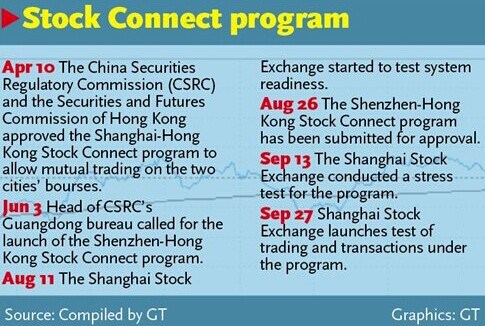

Overseas investors may be exempted from capital gains tax
The Shanghai Stock Exchange (SSE) on Saturday launched the latest test for the stock trading program linking Shanghai and Hong Kong bourses, which for the first time specifies tax rules, a media report said.
Issues such as taxes and fees will be included in the third round of the market function test for the Shanghai-Hong Kong Stock Connect program that allows mutual trading for investors, the 21st Century Business Herald reported Friday.
"International investors are highly concerned about whether authorities will levy capital gains tax when they invest in A shares via the program, and a clarification will facilitate the launch of the program," Song Qinghui, an independent economist and consultant with China Securities Regulatory Commission's Shenzhen branch, told the Global Times Saturday.
According to the report, a 10 percent capital gains tax and a 5-20 percent dividend tax will not be included in the test, and only a smaller stamp duty will be tested.
"It is possible that the capital gains tax will be exempted as an incentive for overseas investors at the primary stage of the program," Song said.
The SSE has not released details of the latest test and was unavailable for comment on Saturday. It said Friday that most mainland securities firms have qualified to join the program.
Around 90 securities firms, accounting for 98 percent of the program's market volume, had completed inspection as of Thursday, and most of them have met requirements to start the program, the SSE told an online press conference via Weibo on Friday.
Nearly 300 institutions such as pension operators, hedge funds and investment banks in North America, Europe and Middle East have participated in SSE's roadshows on the program.
International investors expect the rollout of the program as soon as possible, and some have already set up teams with Chinese background to invest in the mainland's A-share market under the program, the SSE said.
But the exchange did not disclose the exact date the scheme would be officially kicked off. Reuters reported Friday that it will be launched on October 27, citing unnamed sources.
The SSE on Friday also released the final version of detailed rules for the stock trading program, among which permission for margin trading and short selling are the highlights.
Overseas investors have been allowed to conduct margin trading and short selling of A shares in the SSE. However, detailed rules on margin trading and short selling for mainland investors on the Hong Kong stock exchange will be announced later.
The rules have fully taken into consideration all factors related to the market and international investors, as well as cross-border risks, the SSE said.
"Allowing margin trading and short selling will increase the program's attraction to investors from Hong Kong and abroad," Dong Dengxin, director of the Financial Securities Institute at the Wuhan University of Science and Technology, told the Global Times on Saturday.
"As the SSE has set regulations on such trading activities, they are not likely to cause fluctuations in the mainland stock market," he said.
The detailed rules also specify measures to deal with abnormal trading, including suspending trading of related shares or temporarily halting trading on an entire exchange.
"When there are cross-border violations, the two exchanges will use a cooperative supervision mechanism," the SSE said.
Analysts have expressed concerns that the cross-border stock trading program will lead to arbitrage.
Among dual-listed firms, many banking and energy A shares are traded at discounts of more than 10 percent compared to their H shares, while A shares have premiums larger than 30 percent for many industrial and materials firms. Arbitrage opportunities will be more readily explored after the link-up, Tim Craighead, an analyst with Bloomberg Intelligence, said in a research note on Tuesday.
"The arbitrage behavior [in the program] can not be avoided, but we think the room for arbitrage will be very limited," Guo Song, an official with the State Administration of Foreign Exchange, told a press conference on Thursday.
China releases final rules of Shanghai-HK stock link
2014-09-28Shanghai, HK stock program will offer flexibility
2014-09-27Shanghai-HK stock link: instant windfall?
2014-09-22Investors ready for Shanghai-HK stock link
2014-09-14Shanghai-HK stock link to speed up capital market reforms: Barclays
2014-09-09Copyright ©1999-2018
Chinanews.com. All rights reserved.
Reproduction in whole or in part without permission is prohibited.